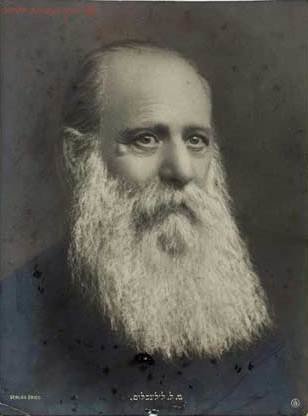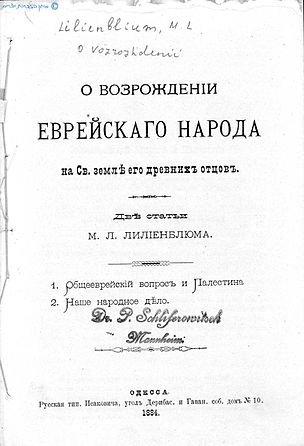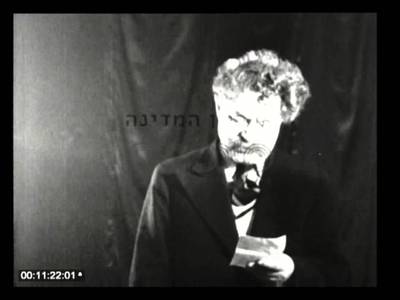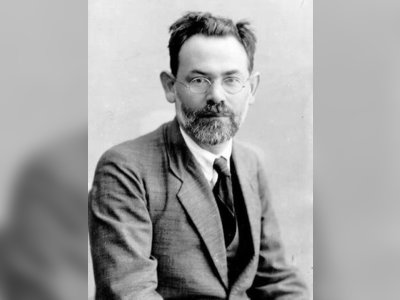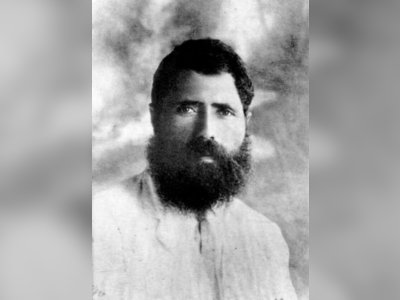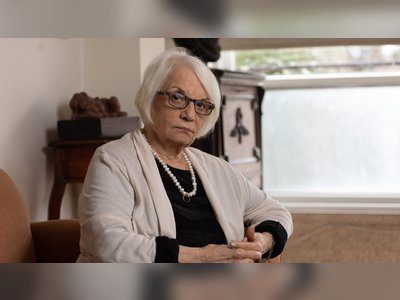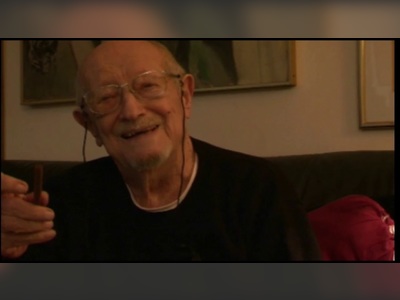מורשת גדולי האומה
בזכותם קיים
beta
Moses Yehuda Leib Lilienblum: Pioneer of Zionist Thought in Russia
Moses Yehuda Leib Lilienblum, often referred to by his initials M.L.L., was a gifted writer and thinker who penned works in Hebrew, Russian, and Yiddish. He stands as one of the prominent figures within the Zionist movement in Russia during the late 19th century.
Early Life and Education
Lilienblum was born in 1843 in the town of Kaidan, located near Kovno, within the Russian Empire (present-day Lithuania). At the age of thirteen, he organized a group of young students to study the "Ein Yaakov." By fifteen, he had married a thirteen-year-old girl, and they settled near her parents in Vilkomir. It was in Vilkomir that Lilienblum gradually became exposed to the critical enlightenment literature, especially that of Nachman Krochmal. However, his advocacy for such ideas aroused the ire of the local rabbis and scholars.
For a brief period, Lilienblum relocated to Kovno, where he received support from the local scholars. But due to financial difficulties, he returned to Vilkomir, where he established a yeshiva for young students and began teaching.
Influenced by the enlightened writer Abraham Mapu, Lilienblum's idealism was centered on the spiritual revival of the Jewish people. He joined the Haskalah movement and, during this period, became a fervent Talmudist while challenging traditional practices that had been upheld for generations, leading to confrontations with the rabbinate. His writings during this period, including "Arachot HaTalmud" and "Nosafot LeArachot HaTalmud," published in the influential journal "HaMelitz," incited the anger of Lithuanian rabbis, particularly Mordechai Gimpel Yaffe and Yosef Zakhariah Shtern, who engaged him in a fierce public debate.
In 1869, Lilienblum moved to Odessa with the intention of learning Russian and preparing for delayed gymnasium studies. However, his disillusionment with the secularism prevalent in the city, which he referred to as the "spirit of licentiousness and heresy carried by the spirit of nationalism," caused him to question his surroundings. In Odessa, he became more conscious of his opposition to the abandonment of Jewish tradition. He was concerned about what he termed "the spirit of licentiousness and heresy carried by the spirit of nationalism." In Odessa, he became more aware of his opposition to the abandonment of Jewish tradition. He longed to rectify the spiritual and economic situation of the Jewish people and believed that settling the land of Israel was a solution. To implement his vision, he devised the concept of founding Jewish settlements in Russia.
His dedication to establishing these settlements waned when the waves of pogroms in the Negev region shifted his focus towards settlement in the Land of Israel. In 1881, he joined the "Lovers of Zion" movement, actively promoting the nationalist idea. He recruited Yehuda Leib Pinsker to the cause. With the establishment of the Society for the Support of Jewish Farmworkers and Artisans in Syria and the Land of Israel, he served as the secretary of the organization until his death. After the First Zionist Congress in Basel in 1897, Lilienblum became a practical Zionist, opposing the spiritual Zionism advocated by some.
In 1872-1873, Lilienblum penned an autobiography titled "Chatat Neurim" or "The Great Confession of One of the Hebrew Writers, Zelophehad Bar Hashim the Perplexed," under a pseudonym. It was published in 1876.
Lilienblum's legacy lives on in various place names across Israel, such as Kfar M.L.L., streets in Jerusalem, Haifa, and Ramat Gan, as well as Lilienblum Street in Tel Aviv, which serves as a prominent thoroughfare. His son, opera singer Shlomo Lilienblum, immigrated to Israel in 1925, settling in Rishon LeZion and marrying Michal, the daughter of Mordechai Havih.
Lilienblum authored diverse works, including biographical accounts and articles in Hebrew, Yiddish, and Russian, all aimed at disseminating his Zionist ideas. His writings were posthumously edited and published by his associates in Odessa. Among his notable works are:
[Here, you can provide a list of some of his key works and publications.]
Moses Yehuda Leib Lilienblum's life and writings continue to inspire those interested in the history of Zionism and the Jewish intellectual tradition.
Lilienblum was born in 1843 in the town of Kaidan, located near Kovno, within the Russian Empire (present-day Lithuania). At the age of thirteen, he organized a group of young students to study the "Ein Yaakov." By fifteen, he had married a thirteen-year-old girl, and they settled near her parents in Vilkomir. It was in Vilkomir that Lilienblum gradually became exposed to the critical enlightenment literature, especially that of Nachman Krochmal. However, his advocacy for such ideas aroused the ire of the local rabbis and scholars.
For a brief period, Lilienblum relocated to Kovno, where he received support from the local scholars. But due to financial difficulties, he returned to Vilkomir, where he established a yeshiva for young students and began teaching.
Influenced by the enlightened writer Abraham Mapu, Lilienblum's idealism was centered on the spiritual revival of the Jewish people. He joined the Haskalah movement and, during this period, became a fervent Talmudist while challenging traditional practices that had been upheld for generations, leading to confrontations with the rabbinate. His writings during this period, including "Arachot HaTalmud" and "Nosafot LeArachot HaTalmud," published in the influential journal "HaMelitz," incited the anger of Lithuanian rabbis, particularly Mordechai Gimpel Yaffe and Yosef Zakhariah Shtern, who engaged him in a fierce public debate.
In 1869, Lilienblum moved to Odessa with the intention of learning Russian and preparing for delayed gymnasium studies. However, his disillusionment with the secularism prevalent in the city, which he referred to as the "spirit of licentiousness and heresy carried by the spirit of nationalism," caused him to question his surroundings. In Odessa, he became more conscious of his opposition to the abandonment of Jewish tradition. He was concerned about what he termed "the spirit of licentiousness and heresy carried by the spirit of nationalism." In Odessa, he became more aware of his opposition to the abandonment of Jewish tradition. He longed to rectify the spiritual and economic situation of the Jewish people and believed that settling the land of Israel was a solution. To implement his vision, he devised the concept of founding Jewish settlements in Russia.
His dedication to establishing these settlements waned when the waves of pogroms in the Negev region shifted his focus towards settlement in the Land of Israel. In 1881, he joined the "Lovers of Zion" movement, actively promoting the nationalist idea. He recruited Yehuda Leib Pinsker to the cause. With the establishment of the Society for the Support of Jewish Farmworkers and Artisans in Syria and the Land of Israel, he served as the secretary of the organization until his death. After the First Zionist Congress in Basel in 1897, Lilienblum became a practical Zionist, opposing the spiritual Zionism advocated by some.
In 1872-1873, Lilienblum penned an autobiography titled "Chatat Neurim" or "The Great Confession of One of the Hebrew Writers, Zelophehad Bar Hashim the Perplexed," under a pseudonym. It was published in 1876.
Lilienblum's legacy lives on in various place names across Israel, such as Kfar M.L.L., streets in Jerusalem, Haifa, and Ramat Gan, as well as Lilienblum Street in Tel Aviv, which serves as a prominent thoroughfare. His son, opera singer Shlomo Lilienblum, immigrated to Israel in 1925, settling in Rishon LeZion and marrying Michal, the daughter of Mordechai Havih.
Lilienblum authored diverse works, including biographical accounts and articles in Hebrew, Yiddish, and Russian, all aimed at disseminating his Zionist ideas. His writings were posthumously edited and published by his associates in Odessa. Among his notable works are:
[Here, you can provide a list of some of his key works and publications.]
Moses Yehuda Leib Lilienblum's life and writings continue to inspire those interested in the history of Zionism and the Jewish intellectual tradition.
- משה לייב ליליינבלוםhe.wikipedia.org
